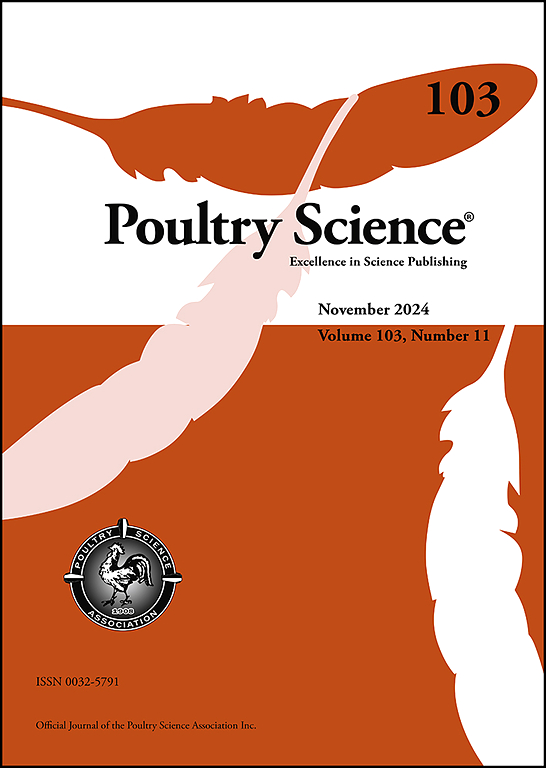Effects of β-glucan on the performance and gut integrity of broilers under acute heat stress conditions
IF 3.8
1区 农林科学
Q1 AGRICULTURE, DAIRY & ANIMAL SCIENCE
引用次数: 0
Abstract
Heat stress (HS) has negative impacts on farm animals. Many studies have been conducted to ameliorate the effects of HS in farm animals. The current project investigated the effects of β-glucan (BG) supplementation under thermo-neutral and HS conditions on the production, physiological, and histological parameters in broiler chickens. Three-hundred and twenty chicks were randomly assigned into four treatments (10 replicates/treatment; 8 chicks/replicate). The treatments were: 1) a basal diet (Ctrl); 2) a diet containing 1 g/kg of β-glucan (BG1); 3) a diet containing 2 g/kg of β-glucan (BG2); 4) a diet containing 3 g/kg of β-glucan (BG3). All treatments were reared under thermo-neutral (TN) conditions from day 0-30 days of age then exposed to cyclical HS at the age of 31 days for 3 consecutive days (4 hours/day). During HS conditions, BG3 has increased feed intake (FI; 23 %; P < 0.01), and decreased rectal temperature (Tr) relative to the control treatment (0.5 °C; P <0.01). Besides, supplementing BG has improved average daily gain under HS conditions. In addition, BG supplementation had a positive effect on intestinal morphometric parameters (villous height, width, depth, and surface area) under HS conditions. In conclusion, feeding BG improved FI, average daily gain (ADG), and intestinal health in heat-stressed broiler chickens.
求助全文
约1分钟内获得全文
求助全文
来源期刊

Poultry Science
农林科学-奶制品与动物科学
CiteScore
7.60
自引率
15.90%
发文量
0
审稿时长
94 days
期刊介绍:
First self-published in 1921, Poultry Science is an internationally renowned monthly journal, known as the authoritative source for a broad range of poultry information and high-caliber research. The journal plays a pivotal role in the dissemination of preeminent poultry-related knowledge across all disciplines. As of January 2020, Poultry Science will become an Open Access journal with no subscription charges, meaning authors who publish here can make their research immediately, permanently, and freely accessible worldwide while retaining copyright to their work. Papers submitted for publication after October 1, 2019 will be published as Open Access papers.
An international journal, Poultry Science publishes original papers, research notes, symposium papers, and reviews of basic science as applied to poultry. This authoritative source of poultry information is consistently ranked by ISI Impact Factor as one of the top 10 agriculture, dairy and animal science journals to deliver high-caliber research. Currently it is the highest-ranked (by Impact Factor and Eigenfactor) journal dedicated to publishing poultry research. Subject areas include breeding, genetics, education, production, management, environment, health, behavior, welfare, immunology, molecular biology, metabolism, nutrition, physiology, reproduction, processing, and products.
 求助内容:
求助内容: 应助结果提醒方式:
应助结果提醒方式:


